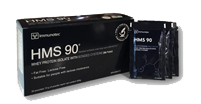Front Immunol. 6:508, 1-9, 2015
Mechanisms of control of Mycobacterium tuberculosis by NK cells: role of glutathione
Tuberculosis (TB), caused by Mycobacterium tuberculosis (M. tb), continues to be one of the most prevalent infectious diseases in the world. There is an upward trend in occurrence due to emerging multidrug resistant strains and an increasingly larger proportion of immunocompromised patient populations as a result of the acquired immunodeficiency syndrome pandemic. Natural killer cells isolated from healthy donors have been shown to lyse infected monocytes and reduce the rate of intracellular M. tb growth (22, 25)… Low levels of intracellular GSH dramatically decrease NK(Natural Killer) cell cytotoxic functions(4,26,70).
Human immunodeficiency virus-positive individuals tend to have much lower NK cell GSH concentrations in comparison to healthy subjects. (10). Although HIV infects CD4 T cells and monocytes, a significant decrease in the intracellular levels of GSH in NK cells has been observed. This is due to elevated levels of circulating TNF-α and ROI (Reactive Oxygen Intermediates) induced by HIV infection, which require the anti-oxidative protection of GSH (12, 73). Decreased GSH levels in NK cells from individuals with HIV infection is accompanied by increased multiplication of M. tb inside monocytes (Figure4D).
Mechanisms of control of Mycobacterium tuberculosis by NK cells: role of glutathione
วัณโรคที่เกิดจากเชื้อแบคทีเรีย Mycobacterium Tuberculosis ยังคงเป็นหนึ่งในโรคติดต่อมีความชุกมากที่สุดในโลก ปัจจุบันมีแนวโน้มอุบัติการณ์ที่เพิ่มขึ้นเนื่องจากการเกิดสายพันธุ์ดื้อยาและสัดส่วนผู้ป่วยภูมิคุ้มกันบกพร่องที่เพิ่มขึ้นเนื่องจากการระบาดของโรคเอดส์ การวิจัยพบว่าเซลล์เม็ดเลือดขาวแนทเชอรัล คิลเล่อ เซลล์(natural killer cells หรือ NK cells)จากอาสาสมัครสุขภาพปกติสามารถย่อยสลายเซลล์เม็ดเลือดขาวโมโนไซต์ (monocytes)ที่ติดเชื้อและลดอัตราการเจริญเติบโตของเชื้อแบคทีเรียวัณโรค การทำงานก่อความเป็นพิษเพื่อกำจัดเชื้อโรคของ NK cells จะต่ำลงอย่างมากเมื่อระดับกลูทาไธโอนในเซลล์ต่ำกว่าปกติ
ผู้ป่วยโรคภูมิคุ้มกันบกพร่องมักมีระดับกลูทาไธโอนในเม็ดเลือดขาว NK cells ต่ำกว่าคนสุขภาพปกติ ถึงแม้เชื้อไวรัสเอชไอวีจะเน้นจู่โจมเซลล์เม็ดเลือดขาว CD4 T-cells และ monocytes เป็นหลัก แต่ระดับกลูทาไธโอนที่ต่ำมากยังสังเกตุเห็นได้ในเม็ดเลือดขาว NK cells ซึ่งมีสาเหตุมาจากปริมาณสารส่งสัญญาณการเกิดการอักเสบ TNF-α และอนุมูลอิสระที่มีมากในกระแสเลือดอันเป็นผลมาจากการติดเชื้อเอชไอวี การติดเชื้อเอชไอวีจึงเป็นภาวะที่มีความต้องการสารต้านอนุมูลอิสระกลูทาไธโอนจำนวนสูงเพื่อปกป้องเซลล์ ระดับกลูทาไธโอนที่ลดลงใน NK cells ของผู้ติดเชื้อเอชไอวีมักตามมาด้วยการทวีพันธุ์เชื้อวัณโรคในเม็ดเลือดขาว monocytes
Tuberculosis (TB), caused by Mycobacterium tuberculosis (M. tb), continues to be one of the most prevalent infectious diseases in the world. There is an upward trend in occurrence due to emerging multidrug resistant strains and an increasingly larger proportion of immunocompromised patient populations as a result of the acquired immunodeficiency syndrome pandemic. Natural killer cells isolated from healthy donors have been shown to lyse infected monocytes and reduce the rate of intracellular M. tb growth (22, 25)… Low levels of intracellular GSH dramatically decrease NK(Natural Killer) cell cytotoxic functions(4,26,70).
Human immunodeficiency virus-positive individuals tend to have much lower NK cell GSH concentrations in comparison to healthy subjects. (10). Although HIV infects CD4 T cells and monocytes, a significant decrease in the intracellular levels of GSH in NK cells has been observed. This is due to elevated levels of circulating TNF-α and ROI (Reactive Oxygen Intermediates) induced by HIV infection, which require the anti-oxidative protection of GSH (12, 73). Decreased GSH levels in NK cells from individuals with HIV infection is accompanied by increased multiplication of M. tb inside monocytes (Figure4D).
HMS 90®
Contact Details
บริษัท อิมมูโนไทย จำกัด245/4 ถ.สุขุมวิท 21 (อโศก) แขวงคลองเตยเหนือ เขตวัฒนา กรุงเทพฯ 10110092-696-6925info@immunothai.co.th

